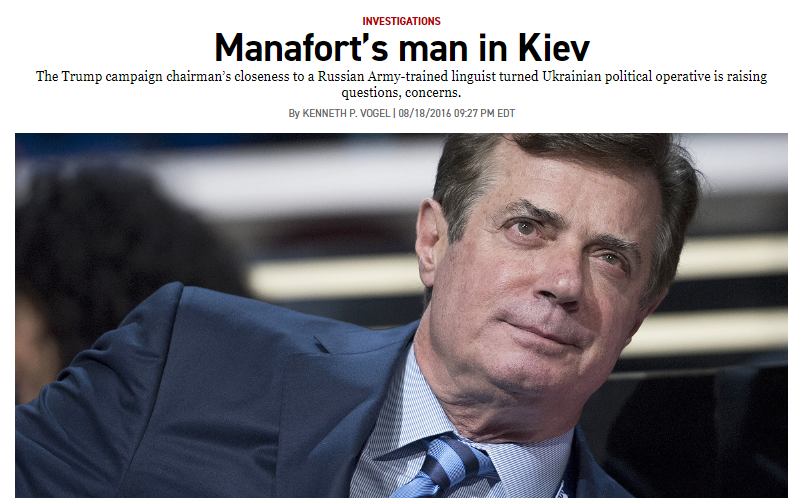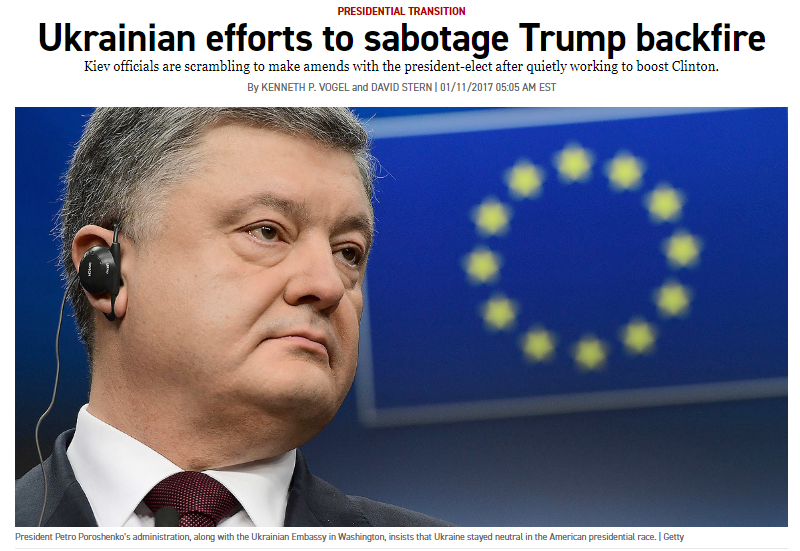Slickly Packaged Anti-Russian US Media Propaganda

Rachel Maddow‘s May 2 MSNBC show, highlighted Andrew Kramer‘s same day New York Times (NYT) article, saying the Kiev regime has decided to limit its cooperation with the Robert Mueller led FBI investigation on an alleged collusion between Donald Trump’s 2016 US presidential campaign and the Russian government. The Kiev regime is presented as feeling pressured to not cooperate with Mueller, for the purpose of maintaining the military aid it has received from the Trump administration.
Maddow’s May 2 show included an appearance by The NYT’s Kenneth Vogel. To conform with her overly subjective and inaccurate spin, Maddow was quite selective in what she wanted out of Vogel. Specifically, Vogel’s August 18, 2016 Politico article about Konstantin Kilimnik, who has had ties to Trump’s former Campaign Manager Paul Manafort. As claimed, Kilimnik might’ve been working with Russian Intel during the 2016 US presidential election campaign. Manafort served for a time as a consultant to Ukrainian President Viktor Yanukovych before the latter’s ouster in 2014.
Screenshot from Politico
On Maddow’s show, Vogel acknowledged some reason to question the extent (if any) of Kilimnik having a Russian Intel relationship for the period at issue. That’s the most objective part of her May 2 anti-Russian propaganda. With the coming months and years in mind, it’ll be interesting to see if anything conclusive comes up to support the notion of an anti-Hillary Clinton operation, involving Kilimnik, the Kremlin, Manafort and Trump, during the 2016 US presidential election.
Maddow started her May 2 show on this subject, with the image of civic minded, freedom loving Ukrainian people, toppling a corrupt pro-Russian leader Yanukovych, followed by his lavish living conditions being exposed to the public. Missing from Maddow’s presentation are these realities:
- Manafort saying that he favored Yanukovych taking a European Union route, over the Russian involved Eurasian Customs Union
- contrary to the pro-Russian stereotype, Yanukovych didn’t always do what the Kremlin preferred – his not advocating for Ukraine to be in the Eurasian Customs Union serving as an example
- the violent nationalists, who committed murderous action during the Kiev street protests against Yanukovych
- the overthrow of the democratically elected Yanukovych, who had just signed an internationally brokered power sharing agreement with his main political opposition
- post-Yanukovych Kiev regime controlled Ukraine, includes a highly corrupt kleptocracy (whose lavishness hasn’t been featured in the manner of Yanukovych’s), meshed with an enhanced ultra-nationalist element, that has led to numerous deaths
- the considerable unpopularity of that regime.
These are obviously inconvenient points for Maddow, who takes the easy way out by not mentioning them. In line with this tact, she omits mention of another article which Vogel had written.
Screenshot from Politico
He coauthored with David Stern a January 11, 2017 Politico article, about the Kiev regime’s 2016 clandestine effort to find damaging information on Trump and Manafort. At the time, the Kiev regime was particularly uneasy with Trump’s position on Russia. CNN later followed up on this issue with Stern. He acknowledged not having as detailed a conversation as Vogel with the Ukrainian-American activist Alexandra Chalupa, who was involved with the Kiev regime’s effort against Trump and Manafort. In the aforementioned CNN segment, Stern was hesitant to equate that activity with what the Russian government has been accused of doing with Trump.
The neocons are pleased with Trump’s decision to increase military support to the Kiev regime. Neolibs have been generally more apprehensive on that move. For its part, Russia is understandably concerned about the Kiev regime, perhaps at some point launching a Croatian scenario into the rebel held Donbass territory. That move could very well lead to an increased exodus to Russia and pressure from within Russia to militarily strike back.
Contrary to what some say, the Russian government isn’t seeking unnecessary armed conflicts – something well worth debating if there’s any doubt. At the same time, the Kremlin can only (within reason) take so much. (Srdja Trifkovic’s May 2 Chronicles Magazine article, argues that the Kremlin has been passive on the domestic and foreign policy fronts.)
In the meantime, the likes of Maddow recklessly use Russia as a political football on a major US cable TV news network, offering little if any diversity in its coverage of that country.
*
Michael Averko is a New York based independent foreign policy analyst and media critic.



